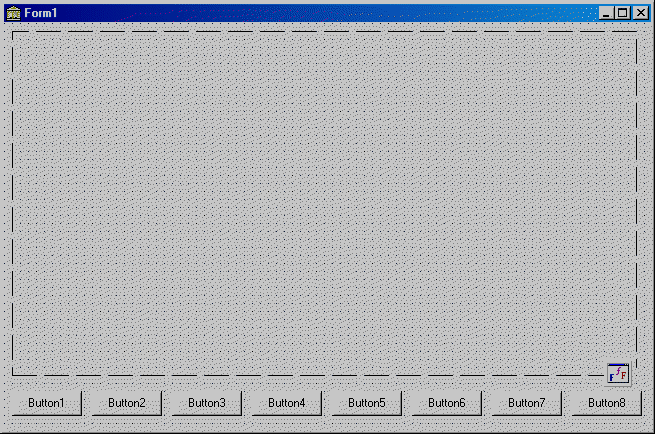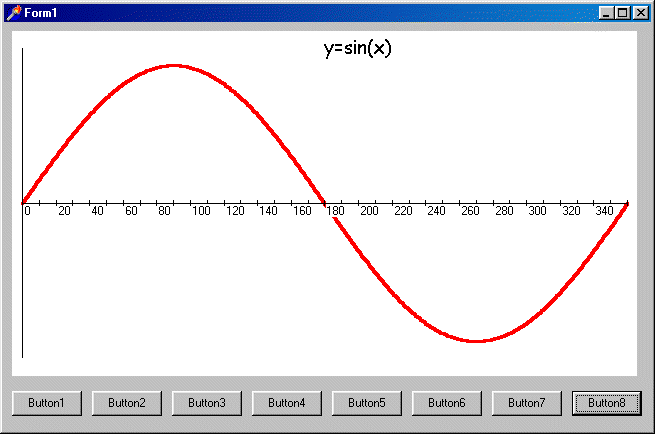
Následující text vznikl jen jako pomůcka pro výklad, náplní cvičení je namalovat graf funkce. Pokud rozumíte komentářům (jsou psány úmyslně anglicky, aby byly univerzální), můžete si tvorbu grafu v osmi krocích vyzkoušet.
Tento program byl vytvořen na formuláři podle následujícího obrázku; také můžete dělat změny postupně do jediného tlačítka. V tom případě byste potřebovali formulář jen s jedním tlačítkem, jedním objektem typu TImage (obrázek, lišta Additional), a pokud chcete zadávat font nadpisu, pak FontDialog z lišty Dialogs:

unit Unit1;
interface
uses
Windows, Messages, SysUtils, Classes, Graphics, Controls, Forms, Dialogs,
StdCtrls, ExtCtrls;
type
TForm1 = class(TForm)
Image1: TImage;
Button1: TButton;
Button2: TButton;
Button3: TButton;
Button4: TButton;
Button5: TButton;
Button6: TButton;
Button7: TButton;
Button8: TButton;
FontDialog1: TFontDialog;
procedure Button1Click(Sender: TObject);
procedure Button2Click(Sender: TObject);
procedure Button3Click(Sender: TObject);
procedure Button4Click(Sender: TObject);
procedure Button5Click(Sender: TObject);
procedure Button6Click(Sender: TObject);
procedure Button7Click(Sender: TObject);
procedure Button8Click(Sender: TObject);
private
{ Private declarations }
public
{ Public declarations }
end;
var
Form1: TForm1;
implementation
{$R *.DFM}
{comment: the eight steps to draw a sine function}
procedure TForm1.Button1Click(Sender: TObject);
var
i : integer;
begin
for i:=0 to 360 do
image1.canvas.lineto(i+10,100 - round (50*sin(i) ));
end;
{the line is strange, because Pascal calculates with radians;
there are one line more, because before drawing a function
we need to move the drawing cursor first}
procedure TForm1.Button2Click(Sender: TObject);
var
i : integer;
begin
image1.canvas.MOVEto(0+10,100 - round (50*sin(0) ));
for i:=0 to 360 do
image1.canvas.lineto(i+10,100 - round (50*sin(i/180*pi) ));
end;
{sinus, but with wrong size - we need to convert to size of our image (in "h" variable)}
procedure TForm1.Button3Click(Sender: TObject);
var
i,h : integer;
begin
h := image1.height;
image1.canvas.moveto(0+10,h div 2 - round (h/2*sin(0/180*pi) ));
for i:=0 to 360 do
image1.canvas.lineto(i+10,h div 2 - round (h/2*sin(i/180*pi) ));
end;
{colored function would be nice, and thick line looks better}
procedure TForm1.Button4Click(Sender: TObject);
var
i,h : integer;
begin
h := image1.height;
image1.canvas.pen.color := clred;
image1.canvas.pen.width := 3;
image1.canvas.moveto(0+10,h div 2 - round (h*0.4*sin(0/180*pi) ));
for i:=0 to 360 do
image1.canvas.lineto(i+10,h div 2 - round (h*0.4*sin(i/180*pi) ));
end;
{graph should be resamopled to all the width of the picture}
procedure TForm1.Button5Click(Sender: TObject);
var
i,h,w : integer;
begin
h := image1.height;
w := image1.width;
image1.canvas.pen.color := clred;
image1.canvas.pen.width := 3;
image1.canvas.moveto(0+10,h div 2 - round (h*0.4*sin(0/180*pi) ));
for i:=0 to 360 do
image1.canvas.lineto(round(i/360*(w-20))+10,h div 2 - round (h*0.4*sin(i/180*pi) ));
end;
{we are still missing axis... important is to set back the pen width and color}
procedure TForm1.Button6Click(Sender: TObject);
var
i,h,w : integer;
begin
h := image1.height;
w := image1.width;
image1.canvas.pen.color := clred;
image1.canvas.pen.width := 3;
image1.canvas.moveto(0+10,h div 2 - round (h*0.4*sin(0/180*pi) ));
for i:=0 to 360 do
image1.canvas.lineto(round(i/360*(w-20))+10,h div 2 - round (h*0.4*sin(i/180*pi) ));
image1.canvas.pen.color := clBlack;
image1.canvas.pen.width := 1;
image1.canvas.moveto(0+10, h div 2);
image1.canvas.lineto(w-10, h div 2);
image1.canvas.moveto(0+10, h div 2 - round (h*0.45*1 ));
image1.canvas.lineto(0+10, h div 2 + round (h*0.45*1 ));
end;
{some marks on horizontal axis (vertical would be the same) }
procedure TForm1.Button7Click(Sender: TObject);
var
i,h,w : integer;
begin
h := image1.height;
w := image1.width;
image1.canvas.pen.color := clred;
image1.canvas.pen.width := 3;
image1.canvas.moveto(0+10,h div 2 - round (h*0.4*sin(0/180*pi) ));
for i:=0 to 360 do
image1.canvas.lineto(round(i/360*(w-20))+10,h div 2 - round (h*0.4*sin(i/180*pi) ));
image1.canvas.pen.color := clBlack;
image1.canvas.pen.width := 1;
image1.canvas.moveto(0+10, h div 2);
image1.canvas.lineto(w-10, h div 2);
image1.canvas.moveto(0+10, h div 2 - round (h*0.45*1 ));
image1.canvas.lineto(0+10, h div 2 + round (h*0.45*1 ));
for i:= 1 to 36 do
begin
image1.canvas.moveto(round(i/36*(w-20))+10,h div 2 - 3);
image1.canvas.lineto(round(i/36*(w-20))+10,h div 2 + 3);
end;
end;
{the last step is the axis labeling}
procedure TForm1.Button8Click(Sender: TObject);
var
i,h,w : integer;
begin
h := image1.height;
w := image1.width;
image1.canvas.pen.color := clred;
image1.canvas.pen.width := 3;
image1.canvas.moveto(0+10,h div 2 - round (h*0.4*sin(0/180*pi) ));
for i:=0 to 360 do
image1.canvas.lineto(round(i/360*(w-20))+10,h div 2 - round (h*0.4*sin(i/180*pi) ));
image1.canvas.pen.color := clBlack;
image1.canvas.pen.width := 1;
image1.canvas.moveto(0+10, h div 2);
image1.canvas.lineto(w-10, h div 2);
image1.canvas.moveto(0+10, h div 2 - round (h*0.45*1 ));
image1.canvas.lineto(0+10, h div 2 + round (h*0.45*1 ));
for i:= 1 to 36 do
begin
image1.canvas.moveto(round(i/36*(w-20))+10,h div 2 - 3);
image1.canvas.lineto(round(i/36*(w-20))+10,h div 2 + 3);
end;
for i:= 0 to 17 do {note: we can label the zero, but there are no place to write "360"}
image1.canvas.textout(round(i/18*(w-20))+10+2,h div 2 - 3 +4,IntToStr(i*20));
{caption of the graph}
if fontdialog1.execute then image1.canvas.font:=fontdialog1.font;
image1.canvas.textout(w div 2, 3, 'y=sin(x)');
end;
end.
Výsledný vzhled programu je zde:

Je patrné, že nejlépe by bylo nechat graf vykreslit až po osách a jejich popisu, protože část číslice "180" překrývá čáru.
Poznámky.
Plochu je možné smazat (například v případě
překreslování grafu) takto:
image1.canvas.filledrectangle...
Příklady:
Vykreslení dat z matice a
...